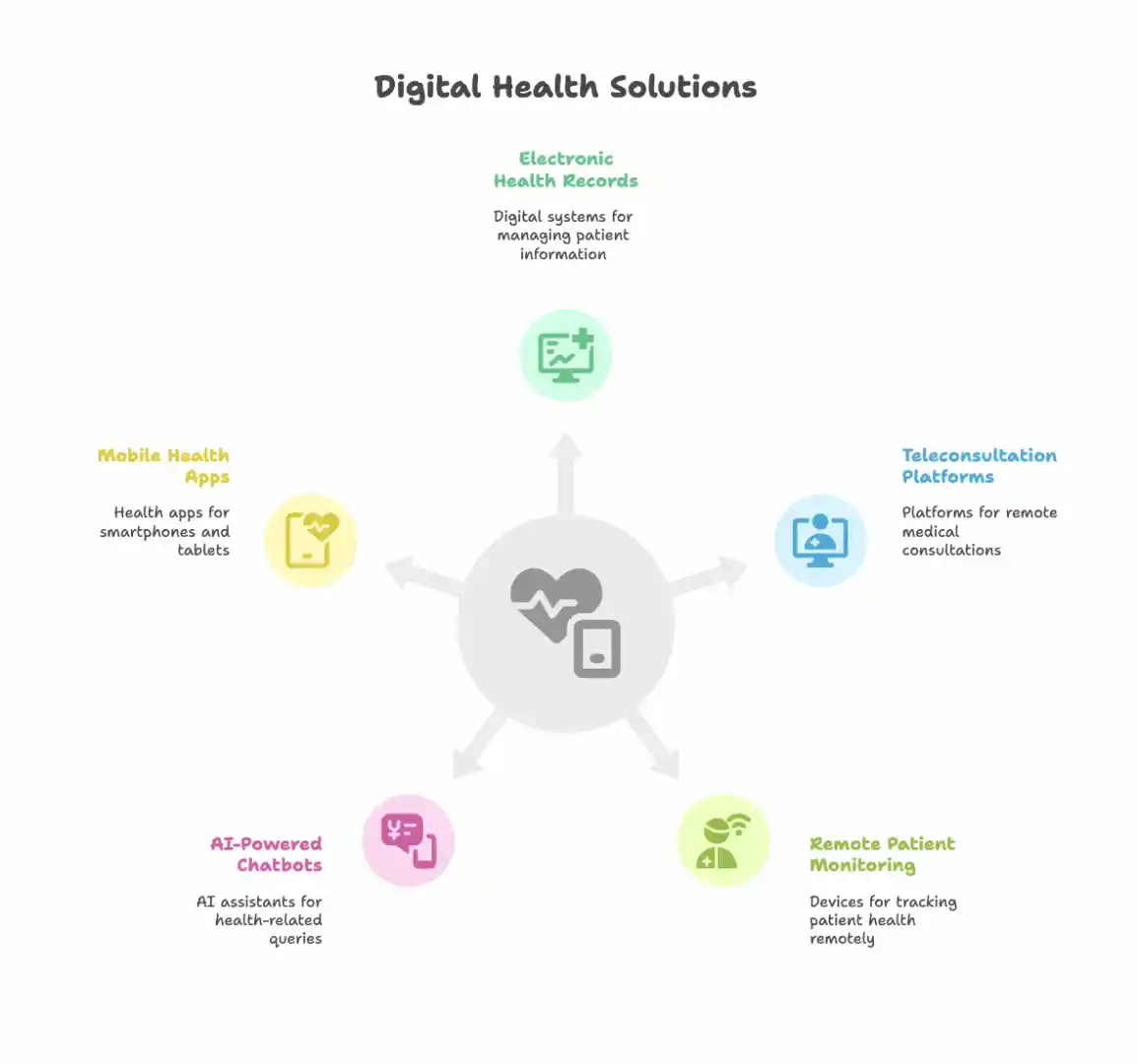Table of Contents
In today’s rapidly evolving healthcare landscape, digital technologies are no longer optional – they’re essential.
With time the demand for faster efficiency in patient care is rising quickly and giving rise to innovative tools that are transforming how medical services are delivered.
No matter if you want to schedule a doctor’s appointment, offer virtual consultation or enable real-time health monitoring. It completely enhanced patient experience.
After COVID-19, digital health started to rise, giving people the chance to adapt to new tech.
So, we will understand how 5 digital health solutions for patient management started to rise….
What Are Digital Health Solutions?
Digital health solutions are technology-driven tools and platforms designed to improve how healthcare is delivered, accessed, and managed.
They combine software, hardware, data, and connectivity to support clinical decision-making and enhance patient experience exponentially and streamline health operations, making the process smooth.
5 Digital Health Solutions For Patient Management
Here are the 5 digital solutions for patient management that will be helpful for you.

Electronic Health Records (EHRs)
EHR is the digital version of a patient’s paper chart. They store comprehensive patient information that helps hospitals in multiple ways by being more decisive and knowing patient health histories.
EHRs are accessible in real time by authorized medical staff.
Pros:
- Easy streamlining of documentation and patient records.
- Enhances care coordination among providers.
- Reduces administrative workload
- Enables data analytics for population health
Cons:
- High initial setup and maintenance costs.
- Security and privacy concerns
- Requires training and workflow changes
- Risk of burnout due to screen time
Teleconsultation Platforms
Now, we have got teleconsultation platforms that are going to help in providing online consultations remotely using video calls and audio.
These platforms are completely built under the adherence to healthcare policies like HIPAA, GDPR.
These platforms allow doctors to diagnose, advise and monitor patients virtually, making healthcare more accessible.
Pros:
- Expands access to care
- Saves time and costs
- Ideal for follow-up and chronic condition management
- Faster triage during health crisis
Cons:
- Not suitable for all cases
- Relies heavily on technology
- Limited personal interaction
- Licensing and jurisdiction issues
Remote Patient Monitoring
Remote Patient Monitoring uses smart devices and wearable technology to collect patients health data outside of traditional clinical settings.
Here are some common RPM tools:
- Glucose monitors for diabetic patients
- Digital blood pressure cuffs for hypertension
- ECG-enabled wearables
Pros:
- Enables continuous, real-time monitoring
- Early detection and proactive care
- Reduces hospital readmissions and ER visits
- Improves patient engagement
Cons:
- Cost and access barriers
- Depends on patient participation
- Risk of data overload
- Privacy and security concerns
AI-Powered Chatbots And Virtual Assistants
In this era AI chatbots are becoming easier to have intelligent conversations with, solving patients’s queries in real time.
They can perform a variety of functions, from answering common health-related questions to booking appointments. These are built through ML and NLP.
Pros:
- Available 24/7 for instant support
- Reduces workload on front desk and support teams
- Improves patient engagement and responsiveness
- Scalable and consistent
Cons:
- Limited understanding of complex or emotional issues
- Lack of human touch
- Risk of misinformation or misdiagnosis
- Privacy and data security concerns
Mobile Health Apps
Mobile health apps are in trend now, and they are helping users manage their health and wellness.
Popular apps like MyChart, Ada, and Babylon allow patients to track vital signs, monitor symptoms, access medical records, and receive lab results.
These apps support both preventive care and chronic disease management.
Pros:
- Empowers patient with self-tracking
- Convenient scheduling and reminders
- Supports healthy habits and treatment adherence
Cons:
- Privacy and data security concerns
- Not all apps are medically reviewed
- Inconsistent user experience
Conclusion
Digital health solutions have reshaped the way healthcare is being delivered, making it faster, more accessible and patient-centred. With tools like EHR, teleconsultation platforms, remote monitoring devices and AI chatbots, this has enabled providers to go beyond to deliver care outside of hospitals and clinics.
This is improving clinical efficiency and streamlining communication, helping patients to take care of their health.
That’s why it is really important for healthcare organisations to evaluate the needs of their patient population. Choose scalable and secure tools.